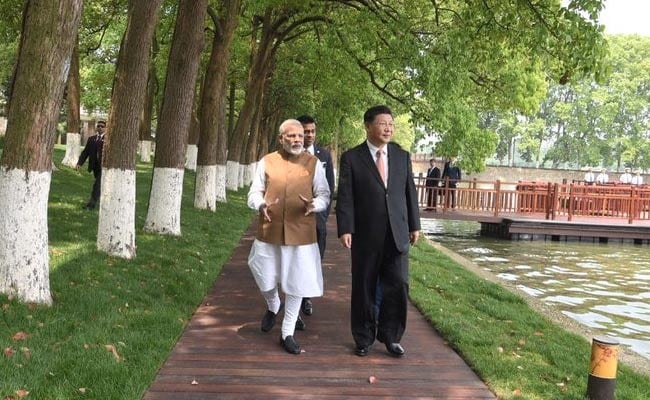
The $50 billion CPEC connects Kashgar in western China with Gwadar port in Pakistan.
Wuhan, China:
Beijing will not stress on India joining China's key Belt and Road infrastructure project, Chinese Vice Foreign Minister Kong Xuanyou said today after an informal summit between Prime Minister Narendra Modi and Chinese President Xi Jinping in Wuhan.
Xi has put his weight behind the OBOR (One Belt, One Road) project as the communist nation works to expand its influence across Asia and beyond. Xi was made China's president for life after the ruling Communist Party amended the constitution in March.
China does not think it is important whether India accepts China's Belt and Road infrastructure project and China won't force it to, Kong told reporters in Wuhan. He also said China does not think the Indian government has changed its official position that Tibet is a part of China.
India has expressed strong reservations against the China-Pakistan Economic Corridor (CPEC), a key segment of the OBOR, as the 3,000-kilometre-long corridor passes through Pakistan-occupied Kashmir, meaning India will under no circumstances accept the project.
The $50 billion CPEC connects Kashgar in western China with Gwadar port in Pakistan.
PM Modi, who was on a two-day visit to China, discussed trade, strategic military relations, tourism and other regional issues with Xi. However, there were no agreements or announcements.
During a press briefing, Foreign Secretary Vijay Gokhale said the two leaders underscored that it is important to maintain peace and tranquillity in all areas of the India-China border region.
 Relations between the world's two most populous countries had been on a downward spiral since April 2015 when China launched the CPEC.
Relations between the world's two most populous countries had been on a downward spiral since April 2015 when China launched the CPEC.
Last year's standoff over Doklam after Chinese forces tried to build a road in the area India says belongs to Bhutan had the two armies standing eyeball-to-eyeball for 73 days. The two sides "disengaged" on August 28.
India has right from the start protested against China's CPEC push.
India's ambassador to China Gautam Bambawale, in a March interview with the Hong Kong-based daily South China Morning Post, had said that if the CPEC meets the norms of an international programme, then New Delhi has no problem.
"One of the norms is that the project should not violate the sovereignty and territorial integrity of a country. Unfortunately, there is this thing called the CPEC which violates India's sovereignty and territory integrity. Therefore, we oppose it," the Indian envoy had told the Hong Kong daily.
The CPEC is also being extended to Afghanistan as it has "not only improved local infrastructure but also is extending toward Afghanistan, reducing poverty, the hotbed of terrorism, and bringing better prospects for local people's lives," China's state-run Xinhua news agency had quoted the report as saying earlier this month.
With inputs from agencies
Xi has put his weight behind the OBOR (One Belt, One Road) project as the communist nation works to expand its influence across Asia and beyond. Xi was made China's president for life after the ruling Communist Party amended the constitution in March.
China does not think it is important whether India accepts China's Belt and Road infrastructure project and China won't force it to, Kong told reporters in Wuhan. He also said China does not think the Indian government has changed its official position that Tibet is a part of China.
India has expressed strong reservations against the China-Pakistan Economic Corridor (CPEC), a key segment of the OBOR, as the 3,000-kilometre-long corridor passes through Pakistan-occupied Kashmir, meaning India will under no circumstances accept the project.
The $50 billion CPEC connects Kashgar in western China with Gwadar port in Pakistan.
PM Modi, who was on a two-day visit to China, discussed trade, strategic military relations, tourism and other regional issues with Xi. However, there were no agreements or announcements.
During a press briefing, Foreign Secretary Vijay Gokhale said the two leaders underscored that it is important to maintain peace and tranquillity in all areas of the India-China border region.

Prime Minister Narendra Modi and Chinese President Xi Jinping had an informal meeting in Wuhan.
Last year's standoff over Doklam after Chinese forces tried to build a road in the area India says belongs to Bhutan had the two armies standing eyeball-to-eyeball for 73 days. The two sides "disengaged" on August 28.
India has right from the start protested against China's CPEC push.
India's ambassador to China Gautam Bambawale, in a March interview with the Hong Kong-based daily South China Morning Post, had said that if the CPEC meets the norms of an international programme, then New Delhi has no problem.
"One of the norms is that the project should not violate the sovereignty and territorial integrity of a country. Unfortunately, there is this thing called the CPEC which violates India's sovereignty and territory integrity. Therefore, we oppose it," the Indian envoy had told the Hong Kong daily.
The CPEC is also being extended to Afghanistan as it has "not only improved local infrastructure but also is extending toward Afghanistan, reducing poverty, the hotbed of terrorism, and bringing better prospects for local people's lives," China's state-run Xinhua news agency had quoted the report as saying earlier this month.
With inputs from agencies
Track Latest News Live on NDTV.com and get news updates from India and around the world

